- Home
- Rae Carson
Walk on Earth a Stranger Page 10
Walk on Earth a Stranger Read online
Page 10
I feel more than hear the soft swoop of wings as a screech owl shadows down from the trees and lands in front of my face. His head twists as he calls out, like a crying baby. His eyes are huge and wide and golden, just like mine.
After a moment, the owl’s silhouette launches back into the sky, and I’m a little sad to see him go, like I’ve lost the night’s one beautiful thing.
He never would have left his tree if the brothers were still around. Still, I don’t move from my pile of leaves until morning quickens with the rising sun.
UNCORRECTED E-PROOF—NOT FOR SALE
HarperCollins Publishers
..................................................................
Chapter Twelve
I crawl out from under my leaf pile and creep back up the hill, where I pause at the camp’s edge. The brothers could be watching this very spot, waiting for me. But everything I owned in the world was here, and I have to see if anything can be salvaged.
I glance around for Peony, as if the brothers wouldn’t take such a perfect, beautiful mare. Tears prick at my eyes. She saved my life with her cantankerous ways. I don’t know how I’ll carry on without her.
If Mama were here, she’d remind me that things could always be worse, and she’d be right. The night was freezing cold, and I was afraid, so I left all my clothes on, including my coat and Daddy’s boots. I’ve got a full outfit, even if it’s filthy from hiding under rotting leaves. I still have Mama’s locket around my neck and nearly ten dollars in my pocket, so I won’t starve for a while yet.
But I’d give it all up to know Peony got away. I hope she’s halfway home to Dahlonega by now.
The camp is a trampled mess. The fire pit is wrecked, and ochre bits of broken jug lay scattered about. My saddlebags are gone, and along with them my knife, the roll of extra shirts, my hat, all my food, even my guns.
My throat tightens to think of Daddy’s Hawken rifle. I loved that gun.
The cut end of Peony’s lead is still hitched to a tree, so I undo it and coil it up. That’s one piece of rescued gear.
I explore the clearing, toeing at leaves and mud with my boots. My bedroll is intact, though it’s thoroughly stomped. I start to roll it up and discover the most wonderful surprise underneath: the cap-and-ball revolver, sitting there, nice as you please. I hardly have time to celebrate before I realize the back of my throat itches, making itself known even through my jangled nerves.
Gold.
I drop to my knees and crawl through the leaves, brushing cold ash and half-burned sticks aside, following the pull. I find them lodged under a small log—four coins total; two tens and two fives. Thirty dollars. They must have gotten kicked aside in the scuffle.
My heart pounds. Can I make it all the way to California with a total of forty dollars? Maybe with a bit of luck. I’m Lucky Westfall’s daughter. If anyone can do it, it’s me.
After shoving the coins into my pocket, I continue circling through the trees. I let out a little yelp. My saddle lies lodged against a trunk at the bottom of the hill. They sliced the straps and tossed it, and I suddenly regret cutting the straps to Hiram’s saddle. The harm we do others always comes back around, Daddy used to say.
I skid down and retrieve the saddle, hefting it over my shoulder. Strange that the brothers didn’t take it. It’s beautiful, and worth a decent price, with diamond patterns punched into the well-oiled leather. Daddy liked his tools and said a smart man always bought the best and took good care of it. Peony’s saddle was another tool to him, and he spared no expense.
Making the climb back to camp with a heavy saddle over my shoulder nearly proves too much. My feet keep slipping, and Daddy’s enormous boots are rubbing a painful blister onto my right heel. The pain evaporates with a sudden thought: They never would have left the saddle behind if they’d caught Peony.
I open my mouth to holler her name, but close it just as quick. Those brothers could still lurking about. Then again, they left the saddle and pistol and coins right where they dropped them. Which means they were hurt bad and needed to see the doc quick. If I were a gambling kind of girl, and I most certainly am not, I’d wager they’ll return to loot the camp in the light of day, just as soon as they’re tended to.
So I take a deep breath and shout it with my whole lungs until I hear it echo back through the rugged hills: “Peony!”
I don’t expect her to come running down the hill like a dog, but . . . I don’t know what I expect.
After calling her name a few more times, I resume the trudge uphill. With luck, she’ll find her way to a good family. One that will pamper her with brushing and treats. One that understands how sometimes even an ornery horse can be the best horse in the world.
When I top the rise, Peony is right there, ears and tail twitching with irritation that I took so long. I drop the saddle and throw my arms around her neck. Her head tosses, as if she’s not sure what all the fuss is about.
I check her over from head to tail, even pull up her hooves and check the frogs of her feet. One shoe might be a bit loose, but other than that she seems perfectly sound. Still, I linger, finger-combing her mane, rubbing my hands down her neck, planting kisses on her nose.
She snuffles at my coat, looking for a treat. Poor girl is probably starving, so I set about figuring how to saddle her up again and getting us out of this place. I consider using the length of lead I rescued to rig a temporary fix. But without a blanket to pad it, the rub would give her a sore. I’ll have to ride bareback, the saddle in my lap.
I use a log to mount up. Holding the huge saddle makes my weight awkward and sloppy, but Peony doesn’t fight it. It’s her way of saying she’s as happy to see me as I am to see her.
When we find our way back to the road, I pause.
I look toward Dalton with half a mind to ride right over and tell the sheriff about those brothers. No, that’s a broken notion. I can’t afford one more delay. Besides, Emmett said they know everyone for miles. Who would take the word of a stranger over theirs?
Even if someone heard me out, they’d have questions about my family, my home, my destination. I’d have to tell a heap of lies. Then once they figured out I’m a girl, they’d tie me up and drag me back to Dahlonega faster than I could sneeze. Back to my no-good viper of an uncle, because he’s my guardian, and a fine-looking, well-spoken gentleman besides.
I turn Peony north, toward Tunnelsville and Chattanooga. We keep to the side of the road so we can hide in the woods at a moment’s notice.
Tunnelsville cozies up to the mountain, a whole town built just to support the work of digging a hole. The houses are bare and crooked, most not even whitewashed, some barely more than lean-tos. The railroad tracks I’ve been following end abruptly at a wide, dark tunnel. From its base, a steep trail climbs up and over the peak. It’s as thick as ants, with people and horses and mules, all laden with packs.
The town has one saddler. He’s a squinty-eyed man with a wisp-thin beard and calloused hands. I ask him about fixing Peony’s saddle while he’s bent over an awl and a strip of cowhide. He mumbles something about taking a couple days because of his other orders.
“No! I mean, no, thank you. Can you refer me to someone else?”
“Nearest saddler is in Dalton, which is more than a day’s . . .” His words freeze halfway out of his mouth when he finally looks up and notices Daddy’s saddle.
He grabs it out of my hands, squints at it closely, turns it over. Then he squints at me and my admittedly ragged condition.
“I’ll make you an offer, son,” he says. “You trade me this saddle for one that’s already fixed.”
While I hesitate, he retrieves it from a wooden saddle rack and hands it to me.
It’s plainer than my daddy’s saddle, smaller and worn. But all the straps are new, and it seems sturdy enough.
“That’ll carry you all the way to Cal
ifornia, no lie,” he says, and I recoil. How did he know? But no, gold fever is in the air, and he’s only talking in a general way.
“Well. Maybe. I . . .”
“Tell you what, you leave your name, and if you decide to come back this way again, I’ll trade you back my saddle for yours, plus the cost of my supplies and labor.”
“That seems fair.” Not that I ever expect to come back this way again, but knowing I could makes it easier to let go. “My name’s Lee . . .”
“Lee?” he says, scratching it into a ledger.
Jefferson’s last name is the first one that comes to mind. “Lee McCauley.”
“All right Mr. McCauley, it’s a deal.”
I don’t have to spend any money, which makes it a bargain for me. Even so, giving it up leaves me hollow and empty. First Daddy’s rifle, and now his saddle.
“Sir,” I say, remembering one more thing. My remaining coins are going to disappear so fast.
“Yes, son?”
“Do you have any saddlebags for sale? Just something small, maybe.”
He gives me another studied look, and I’m suddenly glad to be covered in filth. Hopefully, I look more like a beggar boy than a runaway girl.
He rummages through a pile of leather on his workbench. “Here,” he says, handing me a bag. “I was going to cut this up for scraps, but you might get some use out of it yet.”
I swallow, choked up by his kindness. It’s worn, the leather cracking, but with a good oiling it should last a while. He grabs a hat from a peg on the wall and plops it onto my head. There’s a small tear in the brim, but it’ll do.
“That makes the set complete,” he says. “Good luck to you, wherever you’re headed.”
“Thank you,” I gulp out, and turn and flee.
Peony regards the new saddle with disdain. I let her give it a good sniff, and she stops fussing when I tighten the buckles.
The portage trail over the mountain is steep and rocky and ugly as sin, because the whole mountainside is stripped of lumber and trampled. There are so many people traveling it that no one gives us a second look, which suits me just fine. The plodding, heavy-laden mules keep everyone at an agonizingly slow pace, and it’s hours before we crest the ridge and start down.
Halfway to the bottom, Peony stumbles. Her gait takes on a slight lurch.
I hop off. People stuck behind me grumble, but they go silent when I pull up Peony’s left front foot and reveal that she’s thrown a shoe, the same one that I thought might have loosened during our scuffle with the brothers.
I check her hoof thoroughly. No cracking or wear that I can see. Still, there’s no galloping in our near future, even if I see Hiram himself striding toward me.
My heart is heavy as I lead her down the awful, rocky trail, every step a slow agony that puts Peony at risk. Another crowded settlement clusters at the bottom, where the railroad starts right back up again. I wander around, looking for a farrier or at least a blacksmith, but there is only a small boardinghouse, a tavern, and a handful of shanties.
As much as I’d love a soft bed and a watertight roof at the boardinghouse, I don’t dare show my face in town, or part with any precious coins, so we make camp in a clump of bare trees. I spend an hour searching for dry wood this time; can’t risk the smoke giving me away again. I check Peony’s feet, cleaning the bare one of excess mud. Finally, I’m warm, and my eyes are heavy with sleep. Still, I lie awake a long time.
I picture that creased map spread across Free Jim’s counter. Getting out of Georgia was always going to be the hardest part, I tell myself. But I’m almost there. I imagine the colored county squares marching all the way to the Mississippi. Maybe I can chop wood, do chores for food, like I did the other morning. There’s got to be a way.
Horses clop by, and I hear bursts of conversation, and once, even though it’s dark, the echoing ring of a hammer and nails. Gold seekers and merchants, tunnel workers and families—people like me—are all only yards away, but it feels like miles.
Peony and I cross into Tennessee and reach Chattanooga by late afternoon the next day. It’s such a pretty place, with a wide sparkling river winding through rolling hills that are stubbornly green, even in winter. It puts me in mind of Jefferson, who always appreciates a pretty view. I hope I’m following in his footsteps; that he traveled this exact road, looked down on this exact bend in the river. He was only three days ahead of me. Maybe I’ll run into him here.
No sense getting my hopes up. This is a mighty big country, and Peony throwing a shoe put me behind.
Chattanooga is the first town I’ve seen to rival Dahlonega. It’s big enough that folks don’t look twice as we walk by; they just go about their business along the riverbank. The first blacksmith I find has a farrier’s horseshoe hanging over his door. I lead Peony into the stable area and ask a young man with an apprentice’s apron about getting her shod.
“Pretty girl you’ve got here,” he says, checking her over. “A dollar will get you two new shoes. So her front hooves have even wear.”
Five other horses already crowd his stable, waiting to be shod. “I’m in a hurry. I’ll give you two dollars if you do it right away.” I can’t afford two dollars. Neither can I afford another delay.
“Deal. Come back around suppertime.”
It feels awful to leave her in the care of a stranger, even if for only a few hours. But once she’s shod, we can gallop right out of here and north to Kentucky, just like Free Jim suggested. In the meantime I’ll work up my courage to get some supplies.
I find the feed store first. My heart is aflutter the whole time, even though all I do is buy a small sack of grain. But the transaction goes smoothly enough that by the time I reach the general store, my nerves have calmed. This time, I remember to remove my hat.
Inside, I head toward an iron rack hung with pots and pans. If I buy a small skillet and some flour, I can make flapjacks. I’d planned to supplement my supplies with hunting, before the brothers stole my Hawken. I’m grateful to have the five-shooter, but I’m not well practiced with a revolver, and I’d be lucky to bag even a rabbit or a squirrel. So, flapjacks it is. Flour weighs a lot, but it won’t cost much, and I can make better time if I don’t have to stop for supplies.
Another customer is already at the counter—a tall, handsome young man with magnificent sideburns and a fine coat. He puffs on a cigar while a clerk peruses a list he just handed over.
The clerk frowns. “These are overland supplies, Andrew. Please tell me you didn’t get the fool notion to go gold hunting.”
“It’s just lying on the ground,” the gentleman says around his cigar, “waiting for a man of action to pick it up. But you have to be an early bird, or it’ll be too late. Just like the gold rush in Georgia.”
I inch closer, ears pricked like a cat’s.
“You’re taking everyone? Mrs. Joyner and the little ones too?”
He nods. “I aim to stay on. A prosperous man in California can live like a king.”
“If he’s prosperous enough, he can live like a king wherever he is. The railroad’ll be bringing a lot of opportunities for a smart fellow with connections in these parts.”
“A smart fellow with connections makes his own opportunities wherever he is.”
The clerk laughs and gives up. They dicker over a few items on the list, like shovels and pans and coffee.
“Excuse me! Sirs!” comes a familiar voice. My mouth goes dry.
I catch the barest glimpse of Abel Topper—ragged hat in hand, left suspender strap busted and dangling at his side—before I melt into the shadowy corner.
“Can I help you?” the clerk asks in an annoyed voice.
Topper is between me and the door. If I tried to sneak out now, he’d see me for sure and certain. I keep my back turned and pretend to study a bolt of canvas.
“I’m looking for a hors
e. Well, a horse thief. I expect—”
“Do you mind?” the fine gentleman interrupts. “We are in the middle of a business transaction.”
“Your pardon. It’s just that time is precious—”
“I assure you, there are no horse thieves in Chattanooga. They stay to the back roads.”
“Yes, but—”
“I’d lay odds your thief fled north into Kentucky. That’s the quickest way to lawless lands, where folks like him would feel right at home. Now, please allow me to conclude my affairs.”
“North into Kentucky, eh?” Topper says.
“You a sheriff?” the clerk asks. “A marshal?”
“Naw. Just trying to get in good with the horse’s fancy owner, if you know what I mean.”
“I’m sure I don’t,” the gentleman says.
“Do you have a leaflet?” the clerk asks. “I’d be happy to post it at my door.”
My heart races like a thousand galloping hooves.
“Naw. Never got a good look at the fellow.”
If he doesn’t know I’m the one who took Peony, then he struck off on his own. My uncle didn’t send him. But my relief is short-lived; Abel Topper could describe my horse to anyone, easy as pie.
The gentleman loudly clears his throat.
“Fine!” Topper snaps. “I’m leaving.” Boots tromp away as he mutters something about uppity rich folks under his breath.
“Uncouth fellow,” the clerk says.
“Can’t trust a man with only half his teeth,” the gentleman agrees.
They continue to dicker over supplies, but I pay no attention. I have to get out here. I have to retrieve Peony from the blacksmith and flee before Abel Topper sees her. And maybe I shouldn’t take the road north like I’d planned. Not if that’s the way Topper aims to go.
“So who’s your captain?” the clerk says.
“Rodney Chisholm.”

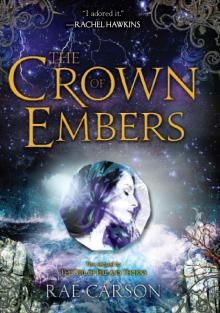 The Crown of Embers
The Crown of Embers The Girl of Fire and Thorns
The Girl of Fire and Thorns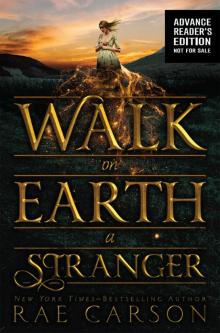 Walk on Earth a Stranger
Walk on Earth a Stranger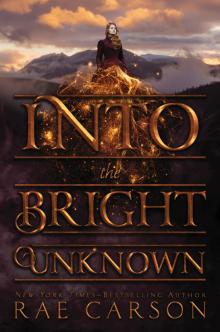 Into the Bright Unknown
Into the Bright Unknown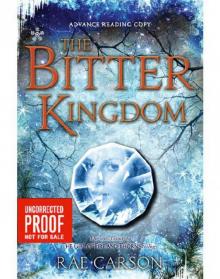 The Bitter Kingdom
The Bitter Kingdom The Rise of Skywalker
The Rise of Skywalker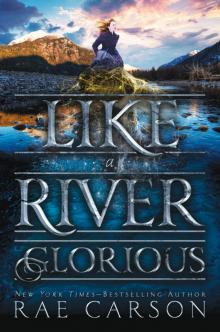 Like a River Glorious
Like a River Glorious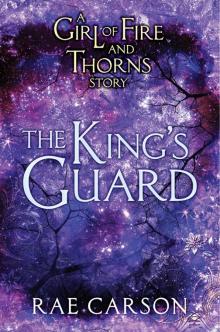 The King's Guard
The King's Guard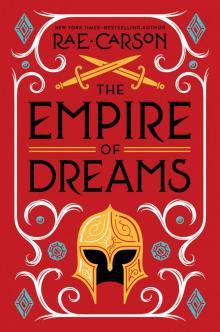 The Empire of Dreams
The Empire of Dreams Most Wanted
Most Wanted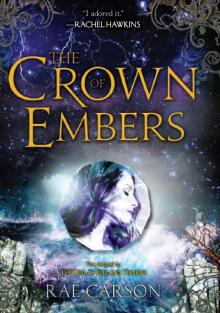 The Crown of Embers fat-2
The Crown of Embers fat-2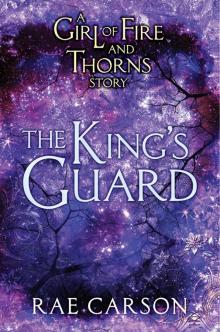 The King's Guard (fire and thorns)
The King's Guard (fire and thorns) The Girl of Fire and Thorns fat-1
The Girl of Fire and Thorns fat-1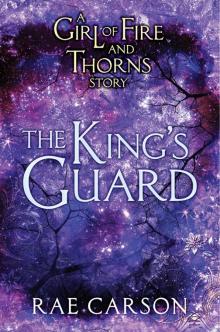 Fire and Thorns 00.7: King's Guard
Fire and Thorns 00.7: King's Guard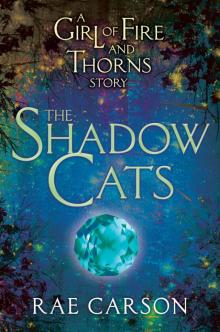 The Shadow Cats (fire and thorns )
The Shadow Cats (fire and thorns )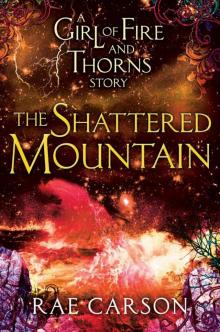 The Shattered Mountain (fire and thorns)
The Shattered Mountain (fire and thorns)